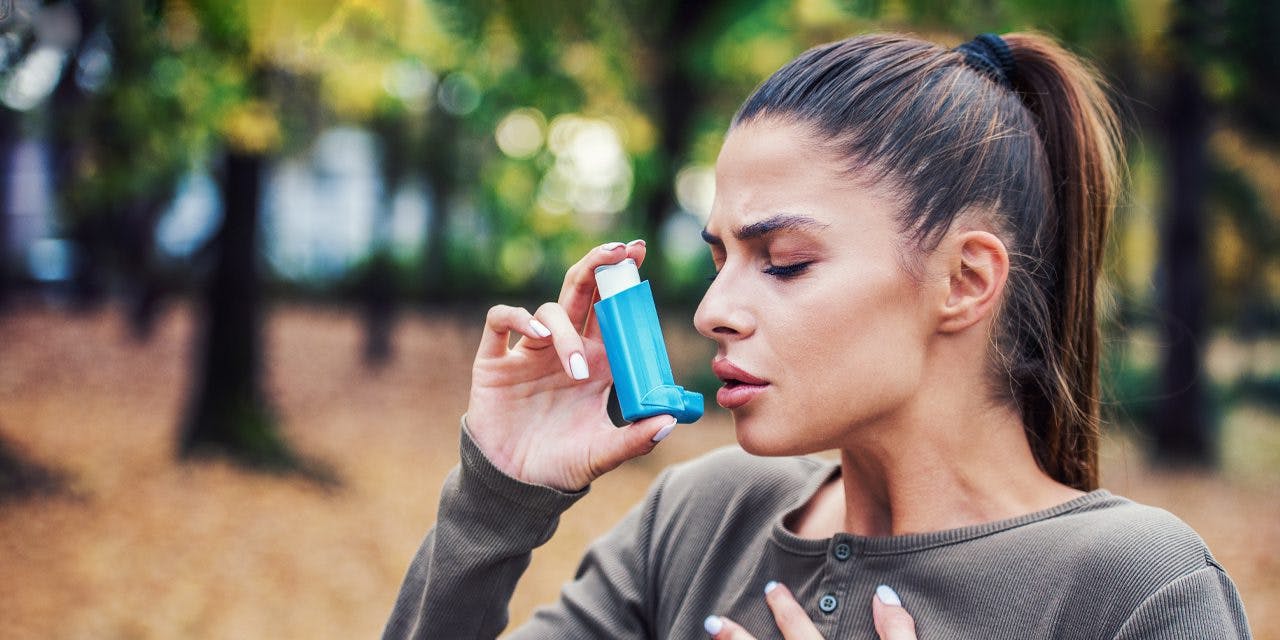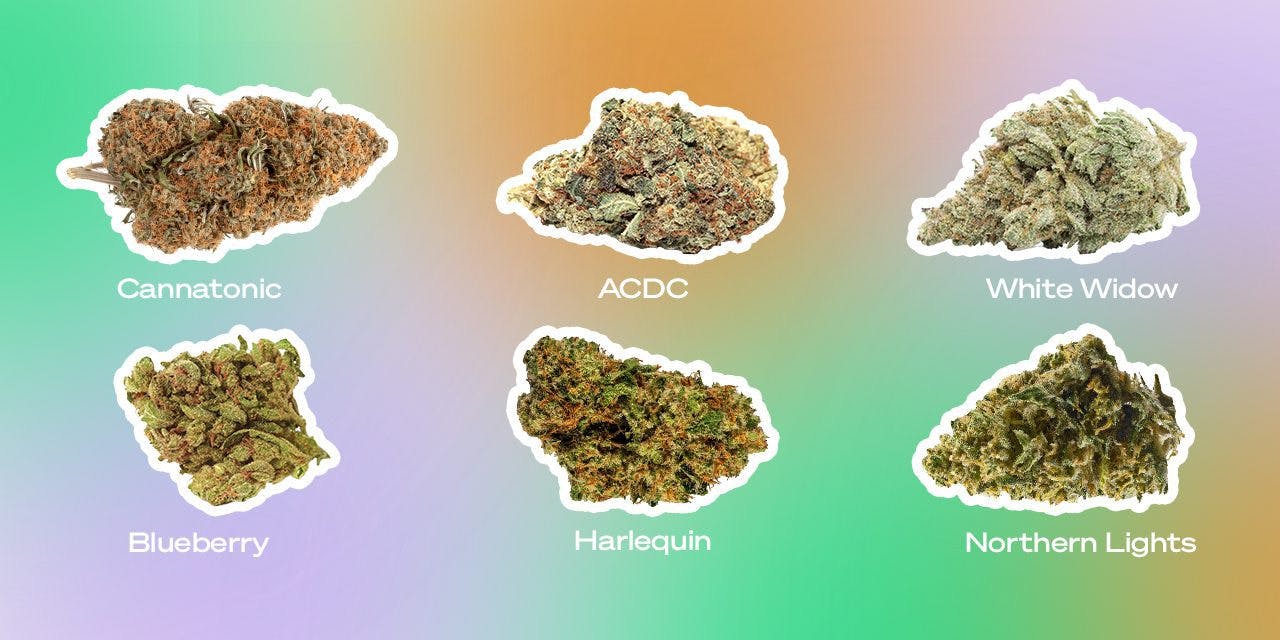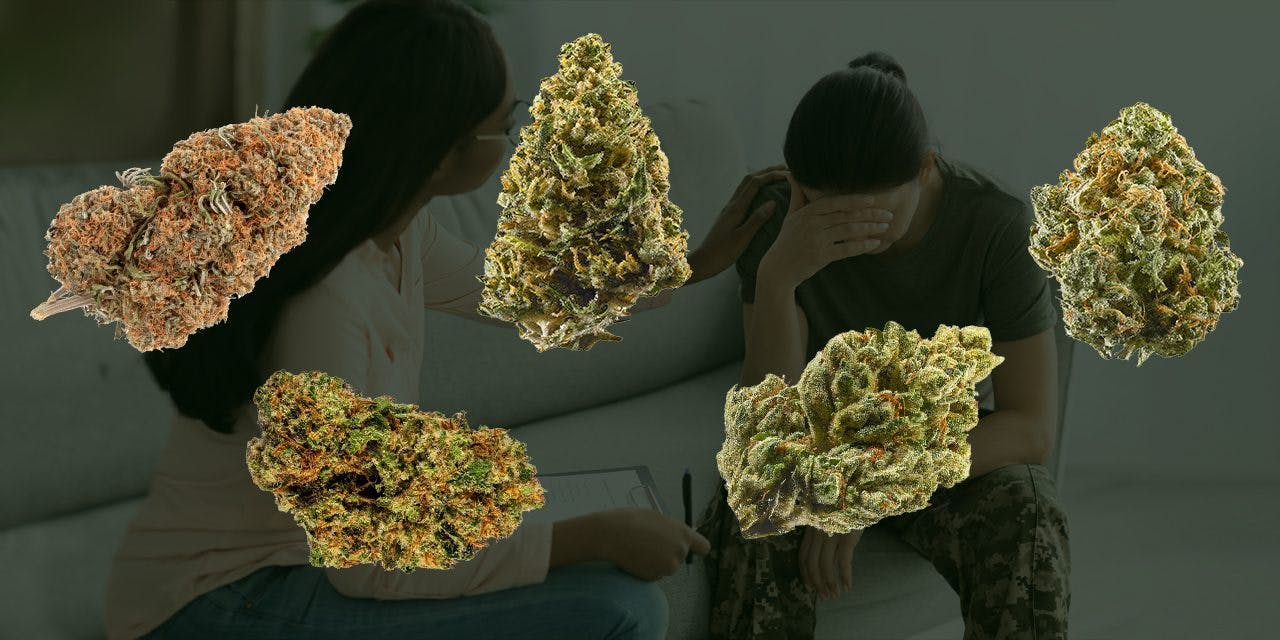6 Best Strains to Help Ease the Effects of Asthma

Article written by

Ruth LemonVP of Operations
Content reviewed by

Dr. Lewis JasseyMedical Director - Pediatric Medicine
Asthma is a respiratory condition in which the airways become inflamed in response to irritants. This causes difficulty breathing, excess mucus production, lung muscle spasms, coughing and wheezing. Examples of irritants that trigger asthma symptoms include exercise, cold air, viral infections and pollen.
Approximately 8% of adults and 7% of children in the U.S. have asthma , representing about 25 million Americans. Adults have a five-fold higher risk of dying from an asthma attack than children. An average of ten Americans die from asthma each day.
Asthma has no cure but some preventatives and treatments are available. Traditional asthma treatments include inhaled short-acting beta-antagonists (SABAs), oral corticosteroids and short-acting anticholinergics. Preventative medications are taken daily to fend off asthma attacks. These include corticosteroids–which can be taken as a pill or inhaled–biologic medicines and immune cell stabilizers.
Although it seems counterintuitive, cannabis may help relieve asthma symptoms. Cannabis is a bronchodilator. This means it relaxes the muscles in the airways, making it easier to breathe.
Get your medical marijuana card
Connect with a licensed physician online in minutes.
How Cannabis Could Help Asthma
Cannabis contains many molecules called cannabinoids that act on cannabinoid receptors throughout the body. These are referred to as CB1 and CB2 receptors. CB1 receptors are primarily found in the brain and the nervous system. They are involved in regulating nausea and vomiting, as well as the psychoactive effects of cannabis. CB2 receptors are found throughout the body and in the immune system. CB2 receptors have a role in pain and inflammation regulation. The cannabinoid receptors most important to asthma treatment are those in the lungs, where CB1 receptors are particularly important for muscle tone and spasm control, and CB2 receptors regulate inflammation.
Tetrahydrocannabinol (THC) and cannabidiol (CBD) are the two major cannabinoids found in cannabis. THC produces the psychoactive effects of cannabis, whereas CBD lacks psychoactive effects but carries pain-relieving properties.
When taken to relieve asthma symptoms, cannabinoids bind to the CB1 receptors in the lungs. This causes an effect called bronchodilation, which refers to the dilation of the bronchi and bronchioles airways in the lungs. Dilation of these airways makes breathing easier by relaxing the lung muscles.
In addition to opening the airways, THC and CBD aid in decreasing the production of mucus in the lungs. The body naturally produces mucus to trap foreign particles such as pollen and viruses in the throat to stop them from reaching the lungs and causing issues there. When a person experiences an asthma attack, whether as a result of a physical irritant like pollen or irritation from exercise, the body increases the production of mucus to prevent additional foreign particles from reaching the lungs. However, excess mucus production makes breathing difficult and is often not necessary during an asthma attack as the irritant cannot always be trapped by mucus (such as in the case of cold air or exercise).
CBD also has anti-inflammatory effects. Inflammation is the result of the body’s immune response to foreign particles and pathogens. The symptoms experienced during an asthma attack are the result of inflammation. In the case of asthma, the body initiates an immune response even when the irritant is not dangerous. CBD binds to the CB2 receptors, which modulates the immune system and reduces the activity of inflammatory cells, thereby reducing the symptoms of asthma.
In addition to cannabinoids, cannabis contains many terpenes. Limonene, myrcene, eucalyptol and pinene are terpenes thought to have anti-inflammatory properties and may also assist in relieving asthma symptoms.
Download Free Guide to CBD
Download Free Guide to THC
Best Cannabis Ingestion Methods for Asthma
The best cannabis ingestion method for asthma treatment is via an inhaler. When an asthma attack occurs, treatments need to reduce symptoms quickly, and inhaling cannabis is the fastest way for this to happen. When inhaled, cannabis takes effect rapidly, increasing bronchodilation in about 5 minutes. Furthermore, an inhaler is preferred over smoking because smoking cannabis can further irritate the throat and cause asthma-like symptoms. Using a vape pen also works, however CBD oil is too thick for a vape pen and will require thinners, which can also irritate the airways of people who are suffering from an asthma attack.
The next best cannabis ingestion method for asthma treatment is orally via CBD drops. By administering the oil under the tongue, CBD is absorbed and bypasses metabolization in the liver, relieving symptoms quickly. Asthma relief from this method occurs in 15 to 30 minutes. Other oral ingestion methods include edibles and capsules, but these methods take longer to have an effect as the cannabinoids must pass through the liver and be metabolized before they enter the bloodstream. Effects from edibles and capsules occur in 60 to 90 minutes.
Best Cannabis Strains for Asthma
ACDC
ACDC only contains 1% THC, usually resulting in little-to-no intoxicating effects. It is high in CBD (13%), making it one of the most used medical marijuana strains for inflammation.
Harlequin
Harlequin has a THC concentration of 5 to 10%, which is relatively low, and a CBD concentration of up to 11%. This strain gives a relaxing and euphoric effect and lowers inflammation. Due to the low THC content, it does not have a strong psychoactive effect and is appropriate for those new to using cannabis. Furthermore, Harlequin contains myrcene, which is also good for relieving inflammation.
Charlotte’s Web
Charlotte’s Web is a non-intoxicating strain due to its very low THC concentration (0.3%). This makes it a good option for asthma treatment during the day when you need to be focused. Charlotte’s Web has high levels of CBD, which relieves pain and inflammation.
Cannatonic
The Cannatonic cannabis strain provides relatively short-lived relief. It contains 6% THC and up to 17% CBD. Like Charlotte’s Web, it provides relief from asthma symptoms without the psychoactive effects.
CBD Kush
CBD Kush contains a 1:1 ratio of CBD and THC. With 7% of each, it gives mood-boosting and relaxing effects, helping to reduce asthma symptoms. Cannabis strains with a 1:1 ratio are good for beginners as the resulting high is not overwhelming.
Royal Medic
Royal medic contains 10% THC and 12% CBD. It is a good option for asthma relief during the day as the psychoactive effects are minimal and most people experience a clear head after using this strain.
Get Your Medical Card
Connect with a licensed physician online in minutes.
Frequently Asked Questions
Which terpenes help asthma?
Pinene, limonene, myrcene and eucalyptol are some terpenes that are thought to reduce inflammation and may help relieve asthma symptoms.
Can CBD help asthma?
CBD can help with asthma symptoms. CBD binds to CB2 receptors in the body to modulate inflammation, reducing asthma symptoms.
Can weed actually help asthma?
Cannabis contains cannabinoids such as THC and CBD, which modulate inflammation and have pain-relieving and relaxing effects.



